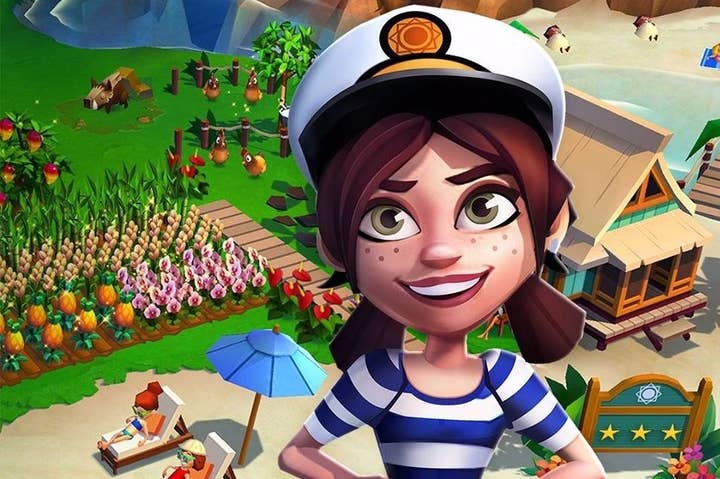"Where are all the women at?"
Farmville: Tropic Escape lead Nicole Opas offers advice on recruiting women devs and appealing to an audience without insulting them
This morning marks the wide release of FarmVille: Tropic Escape. It's the latest in Zynga's invest/express games for mobile, a follow-up to FarmVille: Country Escape with a new theme to match its new mechanics and features. But on top of whatever it does to further the franchise's fortunes, it's also notable for the uncommon construction of its dev team. Nearly 40% of the developers on the team are women, including team lead and Zynga GM Nicole Opas.
"Diversity has been really important for me as a female leader," Opas told GamesIndustry.biz last week. "I've been in the game industry for 18 years, and frankly, I've always had male bosses. So it was important for me to seek out women, whether it be experienced and seasoned female leaders or new employees to our company fresh out of college."
"I've been in the game industry for 18 years, and frankly, I've always had male bosses."
While most people in the industry can name a few high-profile projects or studios with women in the driver's seat--Opas pointed to past versions of The Sims and FarmVille 2 as her examples--she said those are still exceptions
"To be honest," Opas said, "when I go to GDC, I'm like, where are all the women at? There are a lot of advocacy groups like Women in Games International that I participate in, and I think that does indicate that industry-wide, female-led teams are rare... I'd like to see it be more common."
Opas said one factor keeping the number of women in the games industry down is the number of women going to school to get into the games industry.
"In general, I think the way some of the programs, whether they be game design programs or CS type of programs, there's just not a large majority of women," Opas said. "I think we have to create the opportunities, like what I'm trying to do in giving a great example of a mentor or a role model. And that doesn't necessarily mean that if you don't see a women ahead of you, that opportunity isn't there. Like I said, I've worked for only men in my experience, and really great men who have seen the opportunity and talent in me, and advocated for me in the role, regardless of my gender."
So with fewer women in the pool of candidates and companies increasingly acknowledging the benefits of a diverse development team, it might not be enough simply to be willing to add women to the team.
"I don't think we can expect any great candidate is going to come knock on someone's door," Opas said. "How do you reach out to a great candidate? You have to put your work in on it. When it comes to women, there are so many great things happening in small towns, in big cities, as well as online that are ways to connect... You don't necessarily have to have a woman in a leadership role or being the hiring manager or already on the team. I think it's about reaching out to the community of women. There are lots of organization advocating for women. Or imagine a small studio supporting a young woman looking to get into this industry, just opening doors and having a conversation. Or being able to have her identify a mentor, somebody who, male or female, will be someone they can go to for advice. Participating in women's advocacy groups, participating in colleges, showing up to opportunities to introduce your game studio to potential women candidates is a good first start."
It's not surprising that Zynga would want a larger than usual representation of the game's key demographic on the development team considering the game's target audience.
"We really think through about a global game, and if you think in that mentality, players around the world and of all different ethnicities and backgrounds, that's how you avoid some of the stereotypical slant."
"Players who play these games are largely female, 67% of people who play these games are women, on average across the industry," Opas said. "And because they're in the 30-to-40-year-old range, they have a lot of things going on in their life. I know I do, being in that range. And I think about how we can incorporate this game into a player's daily life and how it becomes a joy rather than any sort of blocker to what they're seeking when they pull this game out. We want them to think they're taking a 5-10 minute vacation, like paradise in their pocket when they start playing FarmVille: Tropic Escape."
There can be a fine line between making a game for an audience and making a game for your stereotypical preconception of an audience, and Opas said the team is mindful of staying on the right side of that line.
"We really think through about a global game, and if you think in that mentality, players around the world and of all different ethnicities and backgrounds, that's how you avoid some of the stereotypical slant," Opas said. "That comes with a lot of experience, and that's down to the diversity of the team, because the diversity of the team represents the diversity of our players. I think the stereotypical thing ends up when you start talking about pink games, and we never refer to this game as a pink game."
She added, "I think it's just really getting into the mindset of who our players are. And you have to do that for men or women, but when we think about making games for women, I think it's really about making games for a broad enough market, and that's how we approach games. We don't necessarily sit down and say, 'Only women are going to play FarmVille.'"

